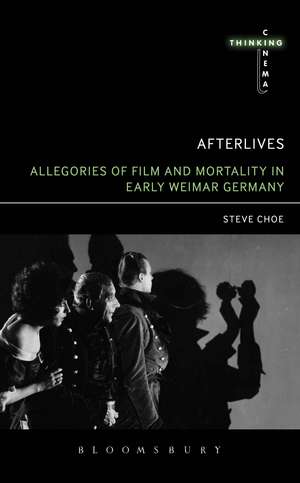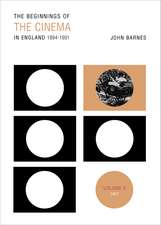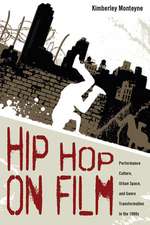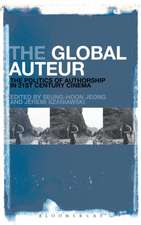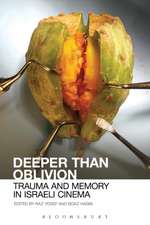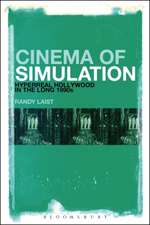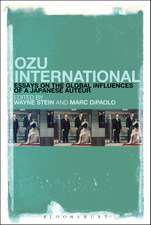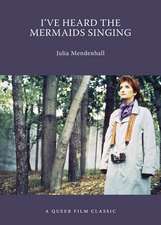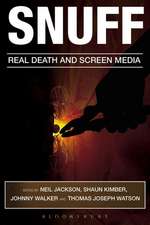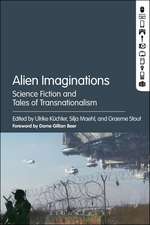Afterlives: Allegories of Film and Mortality in Early Weimar Germany: Thinking Cinema
Autor Steve Choeen Limba Engleză Paperback – 27 ian 2016
| Toate formatele și edițiile | Preț | Express |
|---|---|---|
| Paperback (1) | 257.97 lei 6-8 săpt. | |
| Bloomsbury Publishing – 27 ian 2016 | 257.97 lei 6-8 săpt. | |
| Hardback (1) | 774.20 lei 6-8 săpt. | |
| Bloomsbury Publishing – 24 sep 2014 | 774.20 lei 6-8 săpt. |
Preț: 257.97 lei
Preț vechi: 295.63 lei
-13% Nou
Puncte Express: 387
Preț estimativ în valută:
49.37€ • 51.00$ • 41.06£
49.37€ • 51.00$ • 41.06£
Carte tipărită la comandă
Livrare economică 19 martie-02 aprilie
Preluare comenzi: 021 569.72.76
Specificații
ISBN-13: 9781501317729
ISBN-10: 1501317725
Pagini: 288
Ilustrații: 40 bw illus
Dimensiuni: 152 x 229 x 25 mm
Greutate: 0.39 kg
Ediția:NIPPOD
Editura: Bloomsbury Publishing
Colecția Bloomsbury Academic
Seria Thinking Cinema
Locul publicării:New York, United States
ISBN-10: 1501317725
Pagini: 288
Ilustrații: 40 bw illus
Dimensiuni: 152 x 229 x 25 mm
Greutate: 0.39 kg
Ediția:NIPPOD
Editura: Bloomsbury Publishing
Colecția Bloomsbury Academic
Seria Thinking Cinema
Locul publicării:New York, United States
Caracteristici
Readings of early Weimar films that received little attention in the critical and scholarly literature.
Notă biografică
Steve Choe is Associate Professor of CInema at San Francisco State University, USA.
Cuprins
Acknowledgements Introduction Chapter One: Two Postwar Masculinities Robert Reinert's Nerves (1919)Chapter Two: Melancholy Specters F. W. Murnau's The Haunted Castle (1921) and Phantom (1922)Chapter Three: The Temporality of Destiny Fritz Lang's Destiny (1921)Chapter Four: The Cinematic Other Paul Wegener's The Golem: How He Came Into the World (1920)Chapter Five: Technologies of Vengeance Fritz Lang's The Nibelungen (1924) and Arthur Robison's Warning Shadows (1923)Conclusion NotesBibliography Filmography
Recenzii
Steve Choe's book makes an important and original contribution to the study of Weimar film in its cultural and intellectual historical contexts. He arranges revealing and stimulating critical encounters between ideas of life and death circulating at the time and a series of films, both canonical and less familiar.
In this remarkable, trenchantly argued book combining historical rigour with theoretical sophistication, Steve Choe explores Weimar Cinema as a powerful form of thinking and influential cultural agent in post-World War One Germany. Key films from the period by celebrated directors such as Robert Reinert, F.W. Murnau, Fritz Lang and Paul Wegener are read in conjunction with contemporary philosophical and literary concepts of life and mortality in order to open fundamental questions of the ethics and ontology of the film medium. In a number of startling engagements with individual films that reach far beyond existing critical templates, Afterlives offers a plethora of fresh insights not only into cinema's deep reverberations within Weimar culture but into cinema as modernity's philosophical machine par excellence. Rarely has a book taught me so many new ways of thinking about objects which seemed so familiar.
Choe sets about retheorizing early German cinema through an investigation of film as thought and ontology. Providing a mixture of philosophical, historical, and aesthetic analyses, the author interrogates films such as The Golem, Destiny, and The Nibelungen as engaging in particular modes of philosophical thinking about postwar themes including loss, life, death, and utopia. To demonstrate this idea, he crosscuts between reflections on films of the period, film as such, and contemporaneous and current thinkers and philosophers like Bergson, Freud, Heidegger, Simmel, Deleuze, and Gunning. Choe's elucidation of the multiple ways by and through which film can enter into dialogue with philosophical modes of thought is one of the strongest aspects of this unique work . this work will be useful for scholars of early-20th-century thought as well as Weimar cinema and film theory. Summing Up: Recommended. Graduate students, researchers, faculty.
Choe's insistence on the centrality of ethics to our understanding of film ontology is compelling. the informed engagement with discourses about temporality, movement, and mortality both within the Weimar republic and in current critical works makes the book an excellent choice for graduate classes in film and philosophy. Choe's approach to film as philosophy nuances and complicates the work that has come before it and is a valuable contribution to Weimar film scholarship.
In this remarkable, trenchantly argued book combining historical rigour with theoretical sophistication, Steve Choe explores Weimar Cinema as a powerful form of thinking and influential cultural agent in post-World War One Germany. Key films from the period by celebrated directors such as Robert Reinert, F.W. Murnau, Fritz Lang and Paul Wegener are read in conjunction with contemporary philosophical and literary concepts of life and mortality in order to open fundamental questions of the ethics and ontology of the film medium. In a number of startling engagements with individual films that reach far beyond existing critical templates, Afterlives offers a plethora of fresh insights not only into cinema's deep reverberations within Weimar culture but into cinema as modernity's philosophical machine par excellence. Rarely has a book taught me so many new ways of thinking about objects which seemed so familiar.
Choe sets about retheorizing early German cinema through an investigation of film as thought and ontology. Providing a mixture of philosophical, historical, and aesthetic analyses, the author interrogates films such as The Golem, Destiny, and The Nibelungen as engaging in particular modes of philosophical thinking about postwar themes including loss, life, death, and utopia. To demonstrate this idea, he crosscuts between reflections on films of the period, film as such, and contemporaneous and current thinkers and philosophers like Bergson, Freud, Heidegger, Simmel, Deleuze, and Gunning. Choe's elucidation of the multiple ways by and through which film can enter into dialogue with philosophical modes of thought is one of the strongest aspects of this unique work . this work will be useful for scholars of early-20th-century thought as well as Weimar cinema and film theory. Summing Up: Recommended. Graduate students, researchers, faculty.
Choe's insistence on the centrality of ethics to our understanding of film ontology is compelling. the informed engagement with discourses about temporality, movement, and mortality both within the Weimar republic and in current critical works makes the book an excellent choice for graduate classes in film and philosophy. Choe's approach to film as philosophy nuances and complicates the work that has come before it and is a valuable contribution to Weimar film scholarship.
